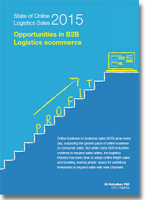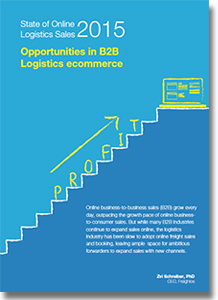State of Online Freight Sales
While many business-to-business sales industries continue to expand sales online, the logistics industry has been slow to adopt online freight sales and booking, leaving ample space for ambitious forwarders to expand sales with new channels.
The Rise of B2B Online Sales
Whether it’s Amazon, or Alibaba, the United States or China, consumers increasingly turn to their web browsers and smartphones when looking for goods or services.
Year after year, online business-to-consumer (B2C) sales continue to grow, shooting from $1.23 trillion dollars in 2013 to $1.47 trillion in 2014, a growth of 19.3%.
This growth is expected to continue, with online B2C sales projected to reach $2.35 trillion by 2018. Alibaba’s “Singles Day”, celebrated annually on November 11th (11/11), pulled in a staggering $9.3 billion dollars in one day - more than the annual GDP of Laos.
But the real shift in online sales are in the B2B sector, not B2C, with sales predicted to reach almost $7 trillion dollars by 2020(2) - a full 27% of global manufacturing trade.
Even today, executives at leading B2B companies expect a full 10% of their sales to be generated online.
Mimicking the rapid growth in the B2C environment, B2B online sales are quickly following.
B2B procurement officers that shop online at home intuitively seek to do the same while at work. As such, an expanded repertoire of services and goods are being offered online.
Experts believe that online B2B sales will exceed B2C sales by over 200% in the next 5 years.
This shift is a natural extension of both changing customer preferences and new online sales platforms.
Why the Online International Freight Landscape Will Change
Technology is changing. Shipper expectations are changing. And forwarder capabilities are changing.
With an expected online B2B market size of $6.7 trillion by 2020, almost 70% of all B2B buyers already buying goods or services online in 2015 and a more competitive freight ecosystem, the writing is on the wall.
Like other B2B buyers, shippers with flexible sourcing, dynamic shipping needs and smaller returns are looking online to select freight forwarders. According to the annual 3PL Study, availability to real-time shipping information and availability of real-time pricing are the two most important CRM technology changes shippers would like to take advantage of.
It is absolutely clear that freight service buyers are online.
What’s Related




Favorites





